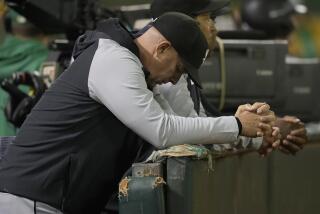Son Remembers Pivotal Figure in the Black Sox Scandal as Good Father
- Share via
TAYLORVILLE, Ill. — Eddie Cicotte Jr. doesn’t remember his father as a crooked baseball player, the ace pitcher of the 1919 Chicago White Sox who came to be known as the “Black Sox”.
“He was a wonderful man,” Cicotte Jr., who lives in Taylorville, told the Springfield State Journal-Register recently.
“He was a family man. I grew up by his side. When I was a little kid he’d say, ‘C’mon Eddie, we’re going fishing today.’ We hunted together and fished together all the time.”
Baseball history will not record that Eddie Cicotte was a good father to his two daughters and son. It barely notes that Cicotte (pronounced See-kot) was one of the best pitchers of his era, winning 210 games against 148 losses with a career earned run average of 2.37; that he led the White Sox to the 1917 World Championship with a 28-12 record and a World Series victory.
Eddie Cicotte’s niche in baseball history is that he was a pivotal figure in the game’s biggest scandal.
Cicotte confessed to a grand jury that he received $10,000 from gamblers for his part in throwing the 1919 World Series to the Cincinatti Reds. He subsequently was banned from baseball for life along with seven of his teammates.
“A lot of people try to get in dirty digs, even now,” says Cicotte Jr., 68. “I try to let it go over my head. I was at the VFW or Legion here once and some wise guy said something. I felt like popping him. But I’m getting too old to do that -- and he was probably as old as I was.”
Born a month after the end of the 1919 World Series, the first time he heard the term “Black Sox” and his father’s role in the scandal was as a youngster at school.
Eddie Cicotte often talked about baseball with his only son, regaling him with stories about his career and the game’s legends with whom he had rubbed shoulders. But he never told his son about the 1919 World Series.
The youngster grew up to be a second baseman, but never played pro ball.
“I had a chance to play with a Cleveland farm team, but I decided not to do it,” says Cicotte Jr., who instead chose a career working for Ford Motor Co. in Detroit.
The movie “Eight Men Out,” patterned after Eliot Asinof’s 1963 book by the same title, brings to light some of the motivating factors behind the scandal.
Cicotte Jr. saw the movie for the first time last week and was deeply moved.
“I thought it was very good. I couldn’t sleep all night after I saw it,” he says softly. “I thought so much of Dad. It was painful in a way to watch the movie.”
“He cried during the movie,” says his wife, Ingrid. “It struck a nerve. When we told the manager he was Eddie Cicotte’s son, I was so proud to be his wife.”
One of the central points of the movie and Asinof’s book is that White Sox owner Charles A. Comiskey created an atmosphere for bribery by severely underpaying his players.
In his book, Asinof writes: “There were betrayals, too. Like Comiskey’s promise to give Cicotte a $10,000 bonus in 1917 if he won 30 games. When the great pitcher threatened to reach that figure, it was said that Comiskey had him benched. The excuse, of course, was to rest him for the World Series.”
And this was an era, Asinof records, when gamblers openly boasted they could fix games as easily as horse races.
Life after baseball meant going home to Detroit, where Cicotte worked for a year as a game warden and later became head of security for Ford Motor Co.
“Oh, he still loved baseball. It was his life. Later on, after games were on TV, I’d visit him and he’d be watching a game,” Cicotte Jr. says. “He wouldn’t want to be interrupted while he was watching a game.”
Cicotte died in 1969 at age 85.
More to Read
Go beyond the scoreboard
Get the latest on L.A.'s teams in the daily Sports Report newsletter.
You may occasionally receive promotional content from the Los Angeles Times.










